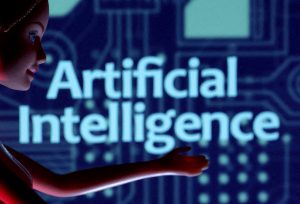The 2024 Delphi Economic Forum that took place this April gave scientists from around the world the opportunity to unveil, the significance and the future potential of Artificial intelligence in different facets of modern societies.

 Antonios Dakanalis, Professor and Principal Investigator in Psychiatry and Psychotherapy at the University of Milan- Bicocca was a key speaker at the forum presenting the groundbreaking uses of AI in mental health but also addressing ethical challenges and misconception regarding this fast evolving technology today.
Antonios Dakanalis, Professor and Principal Investigator in Psychiatry and Psychotherapy at the University of Milan- Bicocca was a key speaker at the forum presenting the groundbreaking uses of AI in mental health but also addressing ethical challenges and misconception regarding this fast evolving technology today.
Professor Dakanalis, whose innovative Artificial Intelligence-based apps for smartphones attracted mass media attention with their ability to detect early symptoms of burnout and mental health was kind enough to speak to To Vima about the potential of AI in mental health.
How will advancements in artificial intelligence reshape the landscape of psychiatric and neurological disease treatment in the foreseeable future, considering the persistent enigma of the human brain’s intricate functions?
Many diseases are managed well today, but other conditions, such as dementia and autism, concern us. Undoubtedly, with advancements in neuroscience, our understanding of the brain’s mechanisms, including neurotransmission, functional brain regions, and substance impacts, has grown significantly. However, there are still many unknown fields and variables, such as the complete understanding of the overall function of the human mind, the precise mechanisms behind various mental and neurological disorders, and those contributing to pharmacoresistance.
However, I believe that the era of AI, which is now beginning in psychiatry, brings a new dynamic. In the field of research, AI can help us decode some of the mysteries of the human brain. We can create a huge volume of data about the brain from genetics, neuroimaging, cognitive assessments, and now smartphones. AI will significantly benefit from its ability to rapidly combine and analyze this vast amount of data, identifying patterns and correlations that will help us deepen our understanding of why some people develop mental and neurological disorders, who responds better to certain treatments, and who may need immediate help.
Furthermore, the use of Big Data in combination with AI will contribute to further understanding the causal mechanisms of psychiatric and neurological diseases, identifying individuals at high risk or those at risk of relapse, developing new mental health promotion programs, and of course, developing new targeted, personalized therapeutic approaches based on the unique characteristics of an individual, which is the great challenge in the field of mental health.
Despite its crucial role in pandemic response, why hasn’t the utilization of AI led to substantial advancements in the development of psychiatric medications, considering its capabilities in symptom analysis and treatment innovation?
It requires specialization, training, interdisciplinary expertise, technical know-how, and many resources both financially and in terms of human capital, which now, I believe, we are more willing to use, seeing the benefits that, as you pointed out, AI has brought to the urgent pandemic phenomenon. Currently, companies operating in the healthcare sector are investing in AI and utilizing it to minimize the risk, cost, and time of developing new drugs, as well as to provide personalized care solutions for patients. In fact, the value of the AI market in healthcare, which was $11 billion in 2021, is projected to reach $187 billion by 2030.
As AI gains traction across industries, including healthcare, where does Greece stand in its integration and development? What are the current stages of AI implementation in Greek healthcare, and what are the recommended next steps for further advancement?
Let’s start with the good news: Greece is showing increasing digital maturity, digital transition and governance are concepts that have entered society’s consciousness, the national strategy for AI is on the horizon, and the number of both Greek scientific publications in the field of AI and new companies operating in software and applications has been steadily increasing over the past five years. Several companies have even been developed that are active in the healthcare sector. For example, Advantis has created neuroimaging software focused on easy visualization and processing of magnetic resonance imaging of the brain, while Intelligencia uses AI to minimize the risk, cost, and time of developing new drugs. Remarkable technological solutions are also provided by other Greek startups such as DeepMed and LANGaware, which harness the power of AI for early and effective detection of neurodegenerative diseases like dementia and providing personalized care solutions for patients.
However, the utilization of AI in daily life is lagging far behind! Indeed, according to analyses by the Observatory of Digital Transformation of SEV, the use of cutting-edge technologies such as AI remains very limited in Greece compared to the rest of Europe. Significant inhibiting factors for the utilization of AI in healthcare include the lack of a sufficient volume of usable health information and data necessary for “training” AI systems and the limited computing power in healthcare structures necessary for executing complex computations. These gaps need to be filled, and Greece must swiftly move towards digitizing all medical records and information.
For the faster integration of cutting-edge technologies into the healthcare sector, it is also necessary to connect universities with businesses and create interdisciplinary centers of innovation.
What role do you attribute to AI in detecting early stages of mental disorders?
The role of AI in detecting early stages of mental disorders is already being implemented across various medical specialties today. It assists, rather than replacing, physicians in clinical decision-making. AI algorithms and programs significantly contribute to the assessment of electrocardiograms within seconds, early diagnosis of Alzheimer’s, and identification of individuals at high risk of aggressive types of cancer.
Despite the need for empathy, which computers cannot (for now) simulate, AI can play a leading role in identifying individuals at risk of developing mental disorders and thus providing timely intervention.
Essentially, AI can be beneficial by gathering a large volume of data from various sources, including electronic health records, genetic data, smartphone data, and wearable devices, and analyze all these data in real-time. It can detect various mental health problems with a high degree of accuracy, up to 100%, including psychotic, mood, and developmental disorders, eating disorders, and suicidal behaviors. This means that AI could offer mental health professionals a significant tool for assessing the risk of self-destructive and suicidal behaviors, which is a major issue in clinical practice.
Moreover, technology and science have advanced to the point where we can detect even subtle warning signs of mental disorders based on the analysis of people’s speech characteristics. Leading colleagues and major companies like IBM are working in this area today. An application for mobile phones and computers was recently developed in the United States, leading users through a series of repeated verbal exercises, such as telling a story and answering questions about their emotional state. Then, an AI system evaluates these audio clips for signs of mental exhaustion, comparing them with both the individual’s previous responses and those of a broader population of patients. The application, tested in areas with inadequate access to mental health services, yielded equally accurate results as mental health professionals in identifying signs of mental distress (e.g., depression) based on speech. I am interested and will soon test this application in Greece, which has many remote areas due to its mountainous terrain and numerous islands.
Beyond the timely and accurate detection of symptoms and mental health problems you mentioned, where else is AI currently being utilized with tangible results?
In early prognosis! My team at the University of Milan has been using AI since 2017 for early prognosis, predicting how our patients will fare and whether they will respond to a specific type of psychotherapy or medication. For example, we have incorporated AI into a program for depression, the scourge of the 21st century. There are patients who do not respond adequately to medications or need to try various medications until the right one is found for them. AI helped us collect and evaluate a wealth of data from genetic material to electronic health records and predict accurately which drug suits whom. This prediction translates into faster patient recovery, improved quality of life, and resource savings.
The results so far in our 5000 patients are very encouraging, and I believe our technique can be expanded across the entire spectrum of psychopathology, bringing us closer to the timeless goal of psychiatric accuracy, which involves tailoring treatment to the individual needs of each patient based on their genetic profile and the clinical picture at a given time.
The central idea is to be able to characterize the disease phenotype at the patient level and propose personalized treatment through the automatic analysis of polymorphic data using AI techniques ranging from machine to deep learning.
Beyond the significant benefits you’ve outlined, there’s always the risk of misusing AI. Is there a margin of error in such management, and what should be done to avoid it?
The first automobile accident occurred shortly after cars appeared on the roads. We didn’t ban them then! We just set speed limits and established codes and laws regulating driving and punishing traffic violations. We should act accordingly here as well. This is important because it must be understood that AI itself is not a danger. What will determine its orientation is the regulatory framework and the way it is used!
Even though the available AI applications in healthcare are relatively straightforward, their misuse can lead to inaccurate and erroneous conclusions. Key to maximizing the benefits of artificial intelligence is training. Medical personnel must be properly trained to use the technology and leverage the results correctly. We are already training with avatars at the University of Milan!
Can personalized use of AI contribute to enhancing our mental health, which, according to research studies, is burdened?
Absolutely!!! The goal now is not just survival in the digital world through the use of digital tools to meet basic needs, such as remote work or education, but to use technology in a way that enhances mental health and holistic well-being for everyone, individually tailored! Highly feasible and necessary today, as according to research studies, our mental health is burdened, fundamentally disrupting the way we sleep, eat, function, learn, work, and perform. Today, 1 in 5 people is dysfunctional and suffers from symptoms of anxiety, depression, or burnout, conditions that cost the global economy billions of dollars annually in lost productivity. This real human need is being addressed by the creation of innovative AI applications for smart mobile phones, which I presented at the recent Economic Forum of Delphi, focusing on personalized care for a sustainable, inclusive, and prosperous future. Through smart algorithms and machine learning techniques, these applications, developed by my team, timely identify symptoms of mental distress and disenchantment and propose solutions that enhance our mental health and well-being, taking into account our individual needs and preferences.
How do the innovative AI applications for mobile phones that you have created and aim to enhance our mental health work, and how do users benefit from them?
Essentially, they collect data such as health history, lifestyle habits, and characteristics closely related to the user’s mental state, such as sleep quality and quantity, stress levels, and daily mood fluctuations through responses to simple questions on the mobile phone or even, at a more advanced level, analysis of speech characteristics, i.e., rhythm, tone, and intensity of voice. It’s important to underline that conclusions are drawn from how we say things rather than from the content of speech.
After all, it’s well known that in Psychiatry, we mainly evaluate non-verbal communication, which conveys 93% of the message. Through the analysis of this data in real-time, our innovative applications, fully aligned with European data protection regulations, can not only timely and accurately identify symptoms of mental distress and disenchantment, such as anxiety, depression, and the well-known burn-out but also provide targeted recommendations, scaled support, and effective interventions tailored to the specific needs and unique characteristics of each user, for every aspect of life, physical, mental, professional, and social (holistic well-being).
Imagine these innovative applications, which are already available in many languages and countries (> 1.5 million users already) and will soon be available in Greece as well, like a google map, which in real-time detects the level of our psychosomatic well-being and accordingly provides us with personalized guidance for better sleep, proper integration of physical activity, and dietary habit change or for stress reduction techniques and management of a wide range of dysfunctional thoughts, emotions, and behaviors.
Can AI support mental health professionals to offer more accessible and affordable care to population groups?
Exactly! Firstly, AI further develops telemedicine, sharing the expertise and knowledge of specialists to supplement healthcare providers, like a general practitioner in a remote setting. For example, there are many AI programs that use images of the human eye to provide diagnoses that would otherwise require an ophthalmologist.
In addition to AI applications for enhancing mental health that my team has developed and are already available at low cost, in the near future, mobile phone applications incorporating AI will allow us to remotely monitor physical and mental health issues in patients and entire population groups, learning not only about the factors hindering their compliance with treatment but also updating us on reactions to treatment or behavioral and symptomatic changes between appointments, so that this knowledge can be integrated into the therapeutic plan.
Does the application of AI pose legal risks (personal data protection)? Is the institutional framework in Greece believed to safeguard health against such risks posed by AI?
Today, sensitive personal health data of citizens are protected by regulatory guidelines provided by GDPR and HIPAA, but technology is always a step ahead. A prerequisite for utilizing AI systems in the fields of physical and mental health and healthcare is the availability of reliable and representative health data. The challenge and difficulty lie in both securing and protecting them from leaks.
The proposed new European Regulation on AI, known as the AI EU Act, sets the first rules to ensure that AI technology will be developed and used by the European family from now on, maintaining absolute respect for citizens’ rights. This is a comprehensive regulatory framework of action among EU member states regarding the terms and specifications for the development, use, and implementation of AI.
Which are the current limitations or areas for improvement in AI applications in the field of mental health, and how do you propose to address them?
Current limitations or areas for improvement in AI applications in mental health include biases in the data they are trained on, lack of transparency in their operation, and the need for ethical standards to prioritize patient well-being. For example, AI systems can be influenced by biases in the data they are trained on, which can lead to inaccurate decisions. Therefore, it is essential for scientists to collect and use high-quality data to train AI systems that are representative of the population they serve. This means ensuring diversity in the data regarding gender, race, socioeconomic background, etc. Additionally, developers should be transparent about how AI systems operate, including the algorithms used and the data they are trained on.
How is it ensured that AI systems or applications in healthcare adhere to ethical standards or prioritize patient well-being?
Ensuring that AI systems or applications in healthcare respect ethical standards and prioritize patient well-being is crucial.
Both my experience with the most advanced robots in the world and recent studies from Stanford teach us that AI not only has reached the point of mimicking humans but also tends to act more cooperatively and altruistically than us humans and cares about the well-being of human beings! However, we must not forget that they could have been programmed differently, which is a matter of choice by the manufacturer/programmer! After all, AI is a fabric in which humans choose the thread, colors, and pattern.
Are you afraid of AI?
I leverage cutting-edge technologies like AI and VR (virtual reality) in the sensitive field of mental health for the benefit of those who suffer or malfunction. However, it is true that we live in an era of exponential technological advancements, and I feel that what I say today may be outdated next month. Nevertheless, I am afraid of the intelligence and mindset of “stuck” humans and sluggish societies. Undoubtedly, AI not only transforms (mental) healthcare but also horizontally and vertically affects our entire lives, triggering extensive discussions about the benefits and risks associated with its rapid development. AI has no consciousness or emotion. It has no positive or negative sign. The orientation and impact of each technology depend on its use and the ethics that guide it. Isaac Asimov’s opinion is extremely relevant: “The saddest aspect of life right now is that science gathers knowledge faster than society gathers wisdom.” That’s why it’s important to ensure that whichever field technology is used in, it serves the common good. We cannot stop the progress of science. Technological advancement is already here and running. However, we can set speed limits and establish a global regulatory framework, influencing the direction of technology towards responsible practices.







